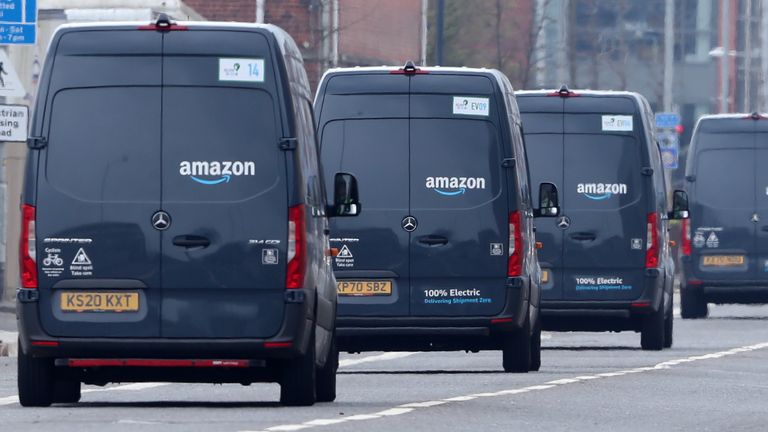[ad_1]
Amazon shares have taken a 10% hit after the e-commerce platform-to-streaming giant admitted it was struggling under a weight of costs that would knock its performance.
The company’s first quarter results included its first quarterly loss since 2015 though the $3.8bn sum was blamed on a $7.6bn writedown in the value of its investment in electric vehicle start-up Rivian.
However, the red ink was overshadowed by its forecasts which showed that the wave Amazon had ridden well during the COVID crisis to date had well and truly dissipated.
It expected to lose as much as $1bn in operating income between April and June – or make as much as $3bn.
Either sum is well down from an operating profit of $7.7bn in the same period last year when the business was benefiting from pandemic-wary consumers shopping from the comfort of their homes and enjoying the additional benefits of their Prime memberships.
Amazon pointed to a slowdown in online shopping demand at a time of increased costs – mostly energy-related.
The headwinds are also linked to global supply chain disruption and labour shortages, as the company has had to offer more money to attract staff.
It has tried to counter these additional costs by raising fees for its Prime membership and it has also added a 5% surcharge to fees it charges third-party sellers who use its fulfilment services.
However, its operating profit projections suggest the actions will not be enough to counter the rising bills at a time when consumer demand is also facing pressure from higher inflation – at a 40-year high in its core US market.
First quarter revenue missed estimates, coming in at $116.4bn – up 7% on the same period in 2021.
Andy Jassy, Amazon’s chief executive, said the company had finally met its warehouse staffing and capacity needs, but it still had work to do in improving productivity at a time when it is facing increasing pressure from a workforce demanding union representation.
He said on the productivity issue: “This may take some time, particularly as we work through ongoing inflationary and supply chain pressures, but we see encouraging progress on a number of customer experience dimensions, including delivery speed performance as we’re now approaching levels not seen since the months immediately preceding the pandemic in early 2020.”
[ad_2]


